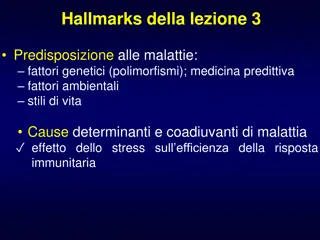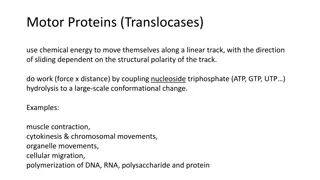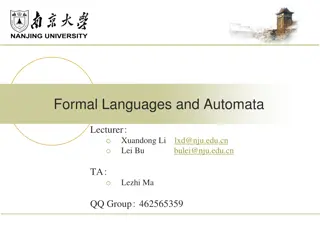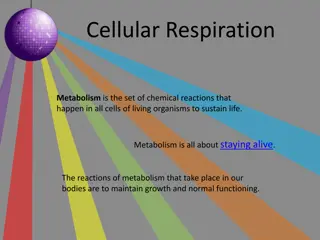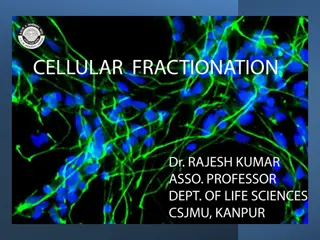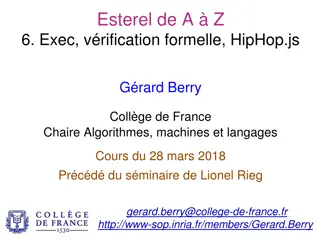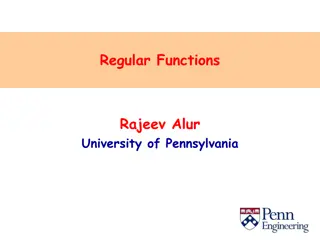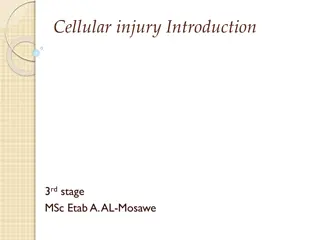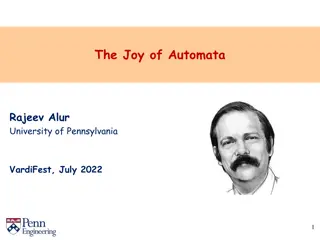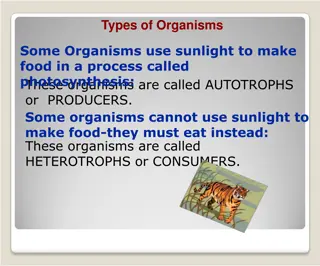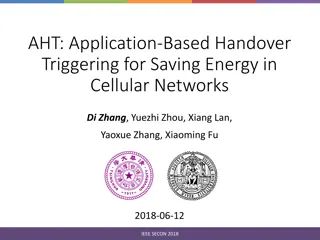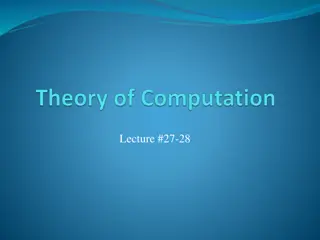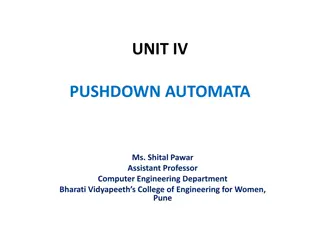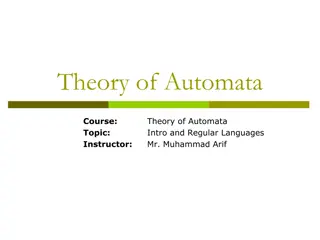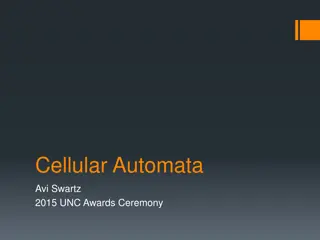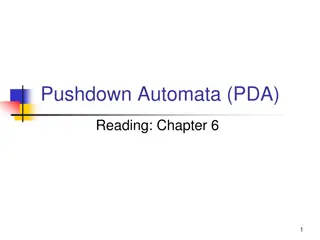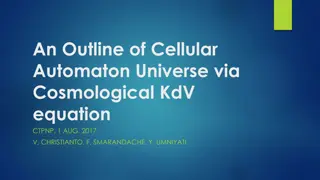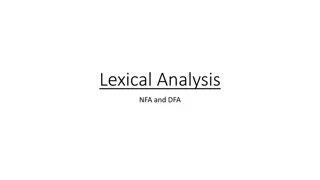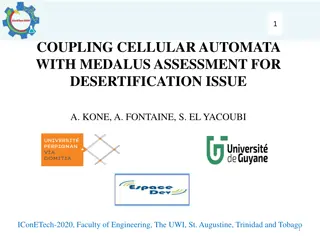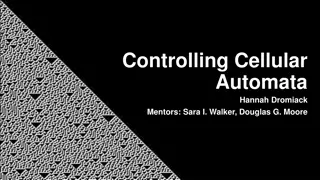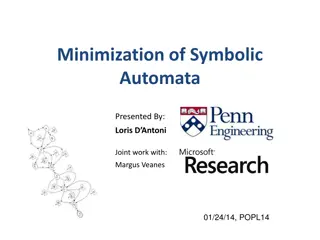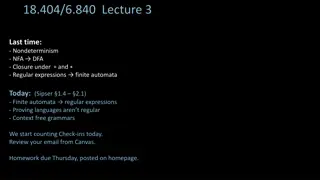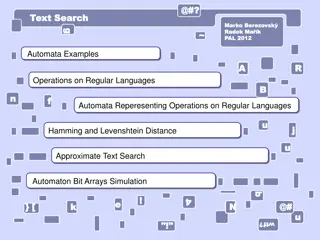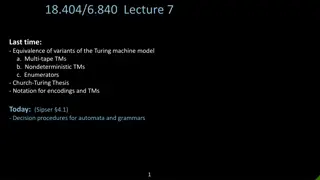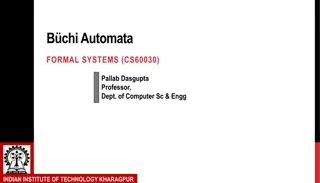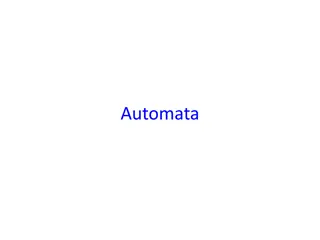Cellular Pathology: Response to Stress and Disease Predisposition
Explore the hallmarks of cellular pathology, including factors influencing disease predisposition such as genetics, environmental factors, and lifestyle. Delve into the cellular response to stress, adaptive and pathological reactions, and key stressors disrupting cellular homeostasis. Uncover how ce
0 views • 51 slides
Motor Proteins and Cytoskeletal Dynamics in Cell Biology
Motor proteins, such as myosin, kinesin, and dynein, utilize chemical energy to move along cellular tracks, influencing processes like muscle contraction, organelle movements, and cellular migration. With the ability to translocate using ATP hydrolysis, these proteins play crucial roles in various c
5 views • 14 slides
Formal Languages and Automata Theory
This course delves into abstract models of computers and computation, offering essential concepts and principles for understanding the fundamental nature of the computer field. Exploring topics such as regular expressions, context-free grammars, and automata theory, students gain insights into the p
4 views • 11 slides
Cellular Respiration and Metabolism in Living Organisms
Cellular respiration is a vital process in all living cells, producing energy through chemical reactions. Metabolism, consisting of anabolism and catabolism, maintains growth and function. ATP plays a central role as energy currency in cells. Through stages like glycolysis and the Krebs cycle, cellu
2 views • 16 slides
Cellular Fractionation: Techniques and Applications
Cellular fractionation is a crucial process for separating cellular components to study intracellular structures and proteins. It involves homogenization, centrifugation, and purification steps to isolate organelles based on their properties like density and shape. This method provides valuable insi
6 views • 11 slides
Formal Verification and Automata Abstraction in Esterel
This content delves into the applications of formal verification and automata abstraction in Esterel, focusing on techniques such as verification by abstraction of automata, boolean verification using BDDs, bounded model checking in SAT/SMT, and more. The work of Gérard Berry at the Collège de Fra
0 views • 38 slides
Abstract Domains for Lists and Heap Structures: A Comprehensive Overview
Explore the concepts of quantified data automata on skinny trees, automatic shapes in static analysis, universally quantified properties on lists, heap configurations with skinny trees, and the extension of quantified data automata over lists. Dive into the abstract domain of automata to capture inf
1 views • 20 slides
Finite Automata and Regular Functions in Computer Science
Exploring the concepts of regular functions, languages vs functions, finite-state computation, finite automata with cost labels, finite automata with cost registers, and examples of Cost Register Automata. These topics delve into the theoretical and practical aspects of defining functions and comput
1 views • 46 slides
Cellular Injury and Its Manifestations
Cellular injury can occur due to various factors like physical trauma, chemicals, radiation, and biologic agents. This process can lead to reversible or irreversible damage in cells, affecting their normal functions and possibly leading to cell death. Manifestations of cellular injury include cellul
1 views • 9 slides
The Legacy of Automata: Insights from Rajeev Alur at VardiFest 2022
Delve into the fascinating journey of Rajeev Alur's contributions to automata theory, from his early mentorship under Moshe Vardi to groundbreaking collaborations and key insights on automata over infinite words. Discover the essence of automata, its significance in decision problems, and the techni
2 views • 32 slides
Automata Theory and Theory of Computation Overview
This course overview covers concepts in automata theory and theory of computation, including formal language classes, grammars, recognizers, theorems in automata theory, decidability, and intractability of computational problems. The Chomsky hierarchy, interplay between computing components, modern-
1 views • 42 slides
Cellular Respiration: Energy Production in Organisms
Organisms can be classified into autotrophs that use sunlight for photosynthesis and heterotrophs that rely on consuming food. Regardless of food source, all organisms obtain energy through cellular respiration, a process that converts stored chemical energy into ATP. This energy currency is essenti
1 views • 21 slides
Energy-Efficient Handover Triggering for Cellular Networks
Mobile devices play a crucial role in today's world, with a surge in mobile subscriptions and applications. However, energy consumption, particularly battery life, remains a challenge. The study focuses on Application-Based Handover Triggering (AHT) as a solution to optimize energy usage in cellular
1 views • 24 slides
Pushdown Automata (PDA) in Computer Science
Pushdown Automata (PDA) are essential in theoretical computer science, serving as an extension of non-deterministic finite automata (NFA). PDAs incorporate a stack, enabling them to recognize non-regular languages. They are described by transitions involving input symbols, state changes, and stack m
1 views • 46 slides
Pushdown Automata (PDA) in Computer Engineering
Pushdown Automata (PDA) is a powerful computational model that extends the capabilities of Finite Automata (FA) by incorporating a stack memory. PDAs can accept languages that FA cannot, making them essential in theoretical computer science. They consist of components like input tape, finite control
0 views • 59 slides
Theory of Automata: Introduction and Regular Languages Overview
This course delves into the fundamentals of Theory of Automata, exploring topics such as regular languages, finite state models, grammars, Turing machines, and more. Instructor Mr. Muhammad Arif guides students through essential concepts like finite automata, pumping lemma, decidability, and Chomsky
1 views • 95 slides
Cellular Automata: A Fascinating World of Rules and Patterns
Delve into the intricate realm of cellular automata, from elementary one-dimensional systems to the renowned Game of Life. Discover the versatility and complexity of these systems, including their capacity for simulating universes and implementing logic gates. Uncover the emergence of life-like beha
0 views • 12 slides
Pushdown Automata (PDA) for Context-Free Languages
Pushdown Automata (PDA) is a crucial concept in the theory of computation, specifically for the recognition of context-free languages. PDAs are an extension of nondeterministic finite automata (NFA) with an added stack memory. This summary provides insights into the definition, transition functions,
0 views • 34 slides
CELLULAR ADAPTATION AND CELLULAR INJURY
The dynamic nature of the cellular environment exposes cells to various stimuli, requiring them to adapt to survive. Cellular adaptation includes atrophy, hypertrophy, and hyperplasia, each with distinct characteristics and responses to stimuli. These processes play crucial roles in maintaining cell
0 views • 25 slides
Insight into Cellular Automaton Universe and Cosmic Sound Wave
This concept paper offers new insight into modeling cosmology through a Cellular Automaton Universe, discussing quantization in astronomy, the definition and application of cellular automata, and the possibility of using solitons to model the cosmic sound wave. Diving into the realms of astrophysics
0 views • 24 slides
Lexical Analysis
Regular Expressions (REs) play a crucial role in describing regular languages, with the ability to convert any RE into a Deterministic Finite Automaton (DFA). This conversion enables the automation of lexical analysis, a fundamental aspect of language processing. Explore the implementation of REs th
0 views • 34 slides
Theory of Computation: CFG, CFLs, and Pushdown Automata
Dive into the world of Context-Free Grammars (CFGs), Context-Free Languages (CFLs), and Pushdown Automata in the realm of theoretical computer science. Explore ambiguity in grammars, learn how to define pushdown automata, compare regular languages with CFLs, and understand the intricacies of languag
0 views • 25 slides
Nondeterministic Finite Automata
Here is a DFA for recognizing binary strings that either start with a 1 or end with a 1. Dive into the concept of Nondeterministic Finite Automata in the context of formal language theory. Explore the theoretical foundations and practical application of DFAs in processing binary strings. Learn how t
1 views • 39 slides
Teaching Finite Automata with AutomataTutor
Explore the key concepts of finite automata with insights from leading experts in the field. Understand the importance of automata in computer science education, common challenges faced by students, and practical examples on drawing DFAs for specific languages. Discover different types of mistakes e
0 views • 38 slides
Theoretical Computer Science: Deterministic Finite Automata
In the beginning of the course, we delve into computational models starting with deterministic finite automata (DFA). Explore the history of automata theory and the significance of DFAs in computing. Witness the foundation of automata theory laid by pioneers such as Kleene, McCulloch, and Pitts.
0 views • 15 slides
Coupling Cellular Automata with MEDALUS Assessment for Desertification Issue
This study explores the connection between cellular automata and MEDALUS assessment in addressing desertification issues. Desertification, a severe form of land degradation affecting arid and semi-arid regions, poses significant challenges to the environment and human well-being. By examining factor
0 views • 17 slides
Understanding Recognizability in Automata Theory
Explore the world of automata theory, from deterministic Turing machines to probabilistic models, and their capabilities in recognizing languages. Learn about the nuances of language recognition, error bounds, and the unique properties of different automata classes.
0 views • 28 slides
Finite Automata: Types, Definitions, and Examples
Learn about Deterministic Finite Automata (DFA) and Nondeterministic Finite Automata (NFA), their definitions, differences, and examples. Understand the key concepts of finite automata, including states, input symbols, initial state, final states, and transition functions.
1 views • 59 slides
Understanding Cellular Automata and Their Applications
Explore the fascinating world of Cellular Automata (CA) - collections of colored cells on a grid that evolve based on set rules and nearest-neighbor interactions. Witness how CA contribute to modern art and nature, and delve into the code outline and references associated with this captivating topic
0 views • 10 slides
Understanding Automata Minimization Techniques and Applications
Explore the concept of automata minimization, which involves finding and collapsing equivalent states to optimize symbolic automata. Discover its applications, such as generating random passwords and handling symbolic finite automata efficiently.
0 views • 44 slides
Understanding DFAs, GNFA, and Regular Expressions in Automata Theory
Explore the concepts of Deterministic Finite Automata (DFA), Generalized Nondeterministic Finite Automata (GNFA), and Regular Expressions in the context of proving language regularity. Learn how to convert between these automata and expressions to demonstrate equivalence.
1 views • 13 slides
Unifying Approach for Multistack Pushdown Automata
Explore the unifying approach for multistack pushdown automata, discussing aspects like finite control, stack operations, and concurrency modeling. Discover how restrictions enhance decidability and intersection closure, offering insights into language classes and automata theory applications.
0 views • 20 slides
Introduction to Finite State Automata: Language and Theory
Explore the world of finite state automata, capturing dynamic behaviors of systems through logical properties. Learn about languages, regular expressions, and how they represent events in systems. Dive into the definitions and examples of regular languages and expressions, unraveling the fundamental
0 views • 18 slides
Language Operations Revisited: Automata and Regular Languages
Explore the operations on regular languages, including union, intersection, and concatenation, along with examples of finite automata construction. Learn about Kleene closure and the relationship between regular languages and automata. Discover how automata support operations on languages.
0 views • 25 slides
Text Search with Automata: NFA, DFA, and Indeterminism Overview
Dive into the world of text search algorithms using Nondeterministic Finite Automata (NFA), Deterministic Finite Automata (DFA), and explore the basics of indeterminism in automata theory. Learn about transitions, states, and processing words with NFA at work.
0 views • 44 slides
Decidability Theorems and Proof Techniques in Automata Theory
Explore the concept of decidability in automata theory with a focus on acceptance, emptiness, and equivalence problems for deterministic and nondeterministic finite automata. Learn about the theorems and proof methods involved in demonstrating the decidability of these key problems.
0 views • 12 slides
Equivalence of Extended Symbolic Finite Transducers
Explore the equivalence of extended symbolic finite transducers in automata theory, including symbolic automata, extended symbolic automata, closure properties, and decidability results. Learn about their applications in various fields like natural language processing, XML, and program analysis.
0 views • 37 slides
Understanding Bchi Automata in Formal Systems - CS60030 Lecture Overview
Explore Bchi Automata in the context of formal systems, focusing on concepts such as Peterson's Algorithm, regular languages, and Nondeterministic Bchi Automata. Dive into topics like verifying regular safety properties and analyzing Peterson's banking system for liveness. Discover the implications
0 views • 33 slides
Understanding Formal Languages and Automata Theory
Explore the concept of formal languages and automata theory, including language concatenation, recognizing languages with machines, and finite automata. Learn about simple automata examples and deterministic finite automata (DFA) definitions in this insightful overview.
0 views • 14 slides
Understanding Automata and State Transitions in MATLAB TCT
Explore the functionality of automata and state transitions using MATLAB TCT. Learn how different states and events impact the behavior of systems, such as cars, in a visual and interactive manner. Dive into the world of automata theory and state transition functions with these informative illustrat
0 views • 27 slides
